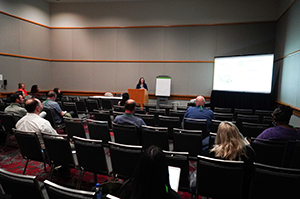
This session, hosted by Sarah Sweetman, Director of Registration and Records at Sturm College of Law, explored how one law school implements anonymous grading & mandatory curves. This session also explored the different challenges in the grading
process from two very different professional school settings and discussed the pros/cons of anonymous grading and mandatory curves from both the law school & non-law school perspectives. Some of the pro's and con's discussed in the opening included:
Pros:
- Eliminates the potential for bias or perceived bias in the grading process.
- Reduces the pressure on faculty when they need to give a low grade to a poor performing student who may have extenuating circumstances, as it allows University processes to manage those circumstances instead of relying on faculty.
- Helps to reduce grade inflation, in that faculty may be more apt to give an earned grade if they do not attribute a particular student to that grade.
Cons:
- Creates a lot of work for a Registrar’s Office to manage to maintain anonymity.
- Need processes to allow faculty to check in with poorer performing students without compromising anonymity for the final grade.
Ms. Sweetman gave a bit about her background before diving into the topic sharing with attendees a quick rundown of her twenty-three-year career in higher education which included five years as Registrar & Grading Coordinator, fifteen years as
Registrar Director of Academic Services in the Graduate School of Social Work, and finally the past three years as Director of Registration & Records at the Sturm College of Law. She shared this to demonstrate her unique perspective
coming from the Graduate School of Social Work into the Sturm College of Law and the difference in approach she found even while working under the same institutional umbrella.
Some of the differences included:
- Graduate School of Social Work
- Supportive Student Center
- Flat Heirarchy
- Non-Competitive Environment
- Blurred Boundaries with faculty advising, mentoring, offering emotional support
- Group Projects
- Sturm College of Law
- Competitive Hierarchical Environment
- Annual GPA Ranking
- Students are often intimidated by faculty
- Mandatory Curves
- Culture often adversarial with students literally competing against each other for rank
Unsurprisingly the two schools also have entirely different grading approaches with the majority of course grades at the Sturm College of Law based on timed exams. Extensive effort is expended to ensure that the exam process is completely anonymous
to both student and faculty to avoid any form of bias throughout. Some of the biases shared included:
- Implicit Bias (unconscious assumptions about a group of people)
- Halo Bias (e.g. student does well on one assignment and the professor assumes that past work will reflect future/present work or vice versa)
- Emotional/Sympathy Bias (e.g. close relationship or empathy for situation on grading)
- Explicit Bias (intentional bias)
At this point, Ms. Sweetman pointed out that the role of the Registrar has progressively gotten more complex sharing a video with attendees (Gandalf telling Frodo "Keep it Secret, Keep it Safe!) to highlight the guardianship and trust placed in the Registrar to maintain ethical data integrity. She went on to outline some, but not all, of the safeguards implemented to ensure that bias is removed from every step of the grading process including:
- Use of proctors or exam software
- Using FERPA friendly exam numbers rather than student names
- Out of sequence exceptions and holding batches of exams back for the possibility that a student must take an exam late due to illness or other complications (thus when the exam is graded there are several anonymous exams being graded at the same time)
- Manual metadata deletion
- Delegated appeal process
- and many more
The session concluded with a lively collaboration between the attendees sharing stories from their perspectives and collaborating on solutions for the issues they were facing. This session felt more like a roundtable discussion than a typical session
in some ways. Nearly all of the attendees were engaged with the post-session discussion and the particular issues they face at their individual institutions. Quite a few attendees lauded the practice of removing in-class participation grades due to
implicit bias.